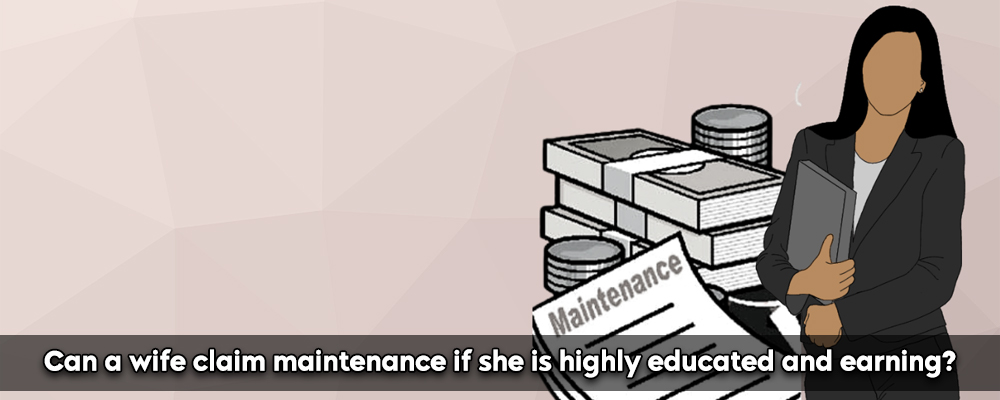Maintenance refers to the sum that the husband must give to the wife (or vice versa) if she is incapable of supporting herself either during the marriage or after a divorce. Essentials like food, clothing, and shelter should be included in maintenance along with reasonable needs for a regular lifestyle, financial security, and well-being.
The payment of maintenance varies according to the faith; for example, under the Hindu Adoption and Maintenance Act, the wife, widow, children, and elderly parents are all entitled to maintenance. Wife, young children, parents, and those who fall under the banned degrees are entitled to maintenance, according to Islamic law.
Need A Legal Advice
The internet is not a lawyer and neither are you. Talk to a real lawyer about your legal issue

Legal Provisions
- A court may issue a maintenance order by the Hindu Marriage Act.
- First, under Section 24 for maintenance pendente lite (interim or temporary) and the costs of the procedures, and second, under Section 25 for alimony and permanent maintenance.
- A Magistrate of the First Class may, upon proof of such neglect or refusal, order such a person to make a monthly allowance for the maintenance of his wife if he or she “neglects or refuses to maintain…his wife, unable to maintain herself,” according to Section 125 of the Code. With the caveat that, should he offer to support his wife as long as she lives with him, and she declines, the Magistrate may take into account any reasons given for her refusal and, if he is convinced that there is a good reason, may issue an order disregarding the offer. When a spouse enters into a marriage with another woman or maintains a mistress, his wife has a legitimate reason to refuse to remain with him. If a couple is living separately by mutual consent and the wife is living in adultery or refuses to remain with her husband for whatever reason, she is not eligible to receive an allowance from her husband under this clause.
- In the Hindu Adoptions and Maintenance Act, of 1956, the husband must support his wife throughout her lifetime. A legal and personal duty is to maintain property. It is an occurrence related to position, estate, or marriage. The definition of “maintenance” is provided in Section 3(b) of the Act. Maintenance includes (i) in all circumstances, provision for housing, food, clothes, education, and medical care, and (ii) in the case of a daughter who isn’t married, the reasonable costs associated with a wedding-related occurrence.
- Section 18 which states about Wife Maintenance that Subject to the provisions of this section, a Hindu wife, whether married before or after the commencement of this Act, shall have the right to be supported by her husband for the remainder of her life.
- If the wife resides with her husband, Section 18(1) is relevant. An ex-Hindu wife is not eligible to receive support. However, a married woman who is not chaste can ask for support if she stays with her spouse.
- Act of 2005 Protecting Women from Domestic Violence law offers a precise and efficient remedy to a party who has suffered domestic abuse while sharing a home with the respondent, including the respondent’s husband. The law’s breadth is broad since it applies to any woman who has been in a marital-style relationship, not only the wife. By Section 20 of the Act, maintenance must be provided. The Magistrate may order the respondent to provide money relief to cover the expenses incurred and losses suffered by the aggrieved person as a result of domestic abuse while deciding on an application under Section 12.
Case Law
The Delhi High Court in X v. Y case, rejected a woman’s request for maintenance, noting that despite the distinction between “capacity” to earn and “actual earning,” the woman was not only highly qualified but also employed both at the time of the marriage and later. Judges Suresh Kumar Kait and Neena Bansal Krishna, sitting as a divisional bench, stated, “We agree with the judgments of the Principal Judge, Family Courts that the appellant (wife) not only is a highly qualified lady but has been working even at the time of her marriage and thereafter. There is no doubt that someone must be required to work just because they are competent, but in this instance, the appellant has been working in addition to (being) qualified. There is without a doubt a distinction between “capacity” and “actual earning,” but in this instance, the document in the records indicates that the appellant has also been working in addition to having the necessary capacity.
Online information, free legal advice, and assistance with the law are all provided by Lead India. Talk to a lawyer directly. Ask a legal question for advice.



